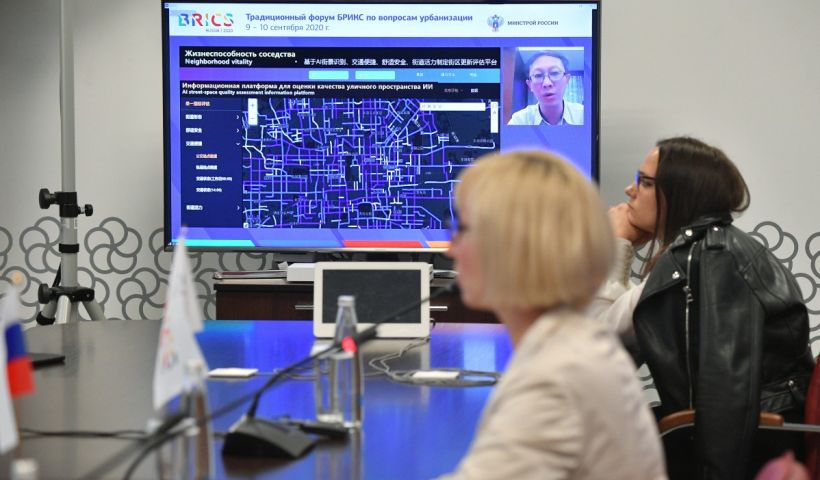On 9-10 September, the Traditional BRICS Urbanization Forum was held online. Experts discussed best practices, key issues and areas of urban development such as smart technologies, transport infrastructure development, an integrated approach to territorial development, investment raising and prospects for the housing and utilities sector transformation.
Maxim Yegorov, Russian Deputy Minister of Construction, Housing and Utilities, Durga Shanker Mishra, Housing and Urban Affairs Secretary of India, Huang Yan, Vice-Minister of Housing and Urban-Rural Development of China, and Carla Carneiro, Head of the International Relations office at the Ministry of Regional Development of Brazil were among the speakers at the plenary session of the Forum.
Representatives of various Line Agencies and major businesses, as well as experts in urban studies, construction, transport, town planning, and digitalization from the five countries were also invited to join the discussion.
“We, like many other countries, are only at the beginning of the way to smart cities, but even now, Russian cities have something to show. Russia has impressive human resources in science, a solid headstart in creating the most advanced technological solutions, and we are ready to continue mutually beneficial international cooperation with the BRICS countries to exchange experience and introduce advanced technologies and solutions,” Maxim Yegorov said.
The Deputy Minister shared Russia’s experience in urban development and also spoke about the national projects such as road construction, the residents’ relocation from dilapidated and dangerous housing, approaches to the creation of urban environment, as well as the experience of involving public in discussing the urban development agenda.
Durga Shanker Mishra said India sees urbanization as an opportunity to promote rapid economic growth and increase people’s wealth. The country is currently implementing a number of major programmes related to urbanization, such as building affordable housing, introducing innovative construction technologies, developing public transport and creating smart cities with an emphasis on convenience, the Internet of Things and climate resilience.
China is showing a rapid growth in urban population: in 2011, the level of urbanisation exceeded 50 percent, and in 2019, for the first time, it grew over 60 percent, Huang Yan said. This means that every year, China actually gets one more city the size of Shenzhen, so urbanization should rely on support for housing constriction, including social housing, education, medicine, and sports – all areas that improve the quality of life. Responding to the challenge to the public administration system, China, in its human development policies, prioritises human needs, improving the urban environment, landscaping and environmental protection to preserve people’s connection with nature.
According to Carla Carneiro, one of the main challenges for Brazil is providing housing for the poor and others whose homes do not meet the standards of quality structures. Brazil’s priorities in urban development are in compliance with sanitary standards, access to water supply – as a high proportion of the population does not have access to clean water – public safety, transport development and environmental issues. Another challenge is ensuring proper urban mobility, because not all people live close to their work or the schools their children go to.
All countries face the same problems: ensuring people’s access to clean water, the need to relocate residents from dilapidated and dangerous housing on a large scale, and to take into account numerous factors and interests of different groups when formulating programmes for integrated territorial development. Therefore, the exchange of best practices is really interesting for everyone and will help find the most suitable solutions for each country, Maxim Yegorov concluded.
